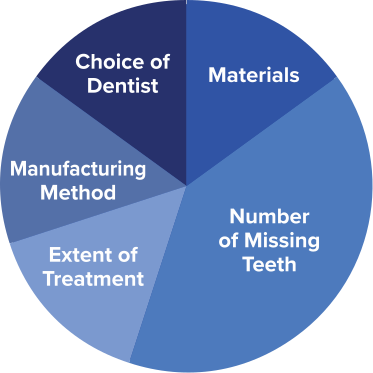Cost of Dental Bridges
A dental bridge can restore a beautiful, healthy-looking smile after tooth loss. This type of restoration can fill the gap left by a missing tooth or several consecutive teeth. Dental bridge cost is shaped by several factors, including the material used, the complexity of the case, additional procedures, and the experience of the dentist. In general, the cost of a traditional bridge ranges from $500 to $1,200 per tooth. Maryland bonded bridges range from $1,185 to $2,340. In order to place a bridge supported by dental implants, the overall treatment cost will be higher since patients will first need to undergo surgery.
Factors Affecting Your Treatment Cost
The price of your dental bridge will largely depend on how many teeth you need to replace. Traditional bridges consist of two dental crowns which are bonded over adjacent teeth and one or more artificial teeth, or pontics. A bridge with a single pontic will cost less than a restoration with two or three. However, many other factors can affect your overall treatment cost.
Understanding Cost

The cost of a bridge is dependent on the number of teeth being treated and the experience of the dentist.
Material
Your dentist can use a range of materials to create your dental bridge. The most affordable type of bridge is made from metal but many patients worry about how this option could detract from their appearance. Advanced materials, such as IPS e.max®, zirconia, and porcelain, cost more. However, they are both durable and incredibly lifelike. Many dentists also offer porcelain-fused-to-metal (PFM) bridges. PFM bridges are more expensive than metal restorations, but can provide a similar level of strength as well as improved aesthetics.
The Structure of a Dental Bridge

A dental bridge is typically comprised of one or more pontics nestled between two dental crowns.
Extent of Treatment
In addition to the number of missing teeth, the location of your missing teeth can complicate your procedure. If you have lost molars at the back of your jaw, you may require a stronger material, which can affect the treatment cost.
While a lower treatment price may save you money in the short term, improper placement of a dental bridge can cause serious oral health issues.
Your overall oral health can also influence your treatment cost. Since neighboring teeth must provide support for the dental bridge, your dentist may need to address underlying issues such gum disease before placing the crowns. Preliminary treatments are typically not included in the base price of dental bridges.
Implant Materials and Preparatory Surgery
For patients receiving an implant-supported bridge, the overall cost will be affected by the number of dental implants which are required. The cost of placing a single implant ranges from $1,600 to $2,200. Often, implant patients also require preparatory treatments, such as bone grafts and sinus lifts. These can add to the cost of treatment and extent the timeline. However, most patients consider implants to be a worthwhile investment. Unlike a traditional bridge, implants can protect the health of the jaw and minimize your risk of more widespread tooth loss.
Level of Experience
Dentists with superior training, qualifications, or experience often charge a higher price for their bridges. While a lower treatment price may save you money in the short term, improper placement of a dental bridge can cause serious oral health issues. Choosing the right dentist can significantly decrease your risk of requiring more expensive procedures in the future.
Financing Dental Bridges
Most insurance companies cover at least a percentage of your dental bridge treatment. Many dentists offer financing plans, such as CareCredit®, to assist you with out-of-pocket costs. Financing typically divides the total cost of treatment into smaller amounts to be paid over the course of several weeks or months. Your dentist can discuss their financing and third-party lender options with you before you begin treatment.
Invest in Your Oral Health
Leaving missing teeth untreated can cause other teeth to shift, and also lead to a range of other health issues such as bone loss. Both traditional and implant-supported bridges can restore missing teeth and protect your smile for years to come. Your dentist can explain available bridge options and provide you with more specific information about the cost of your treatment during an initial consultation.
